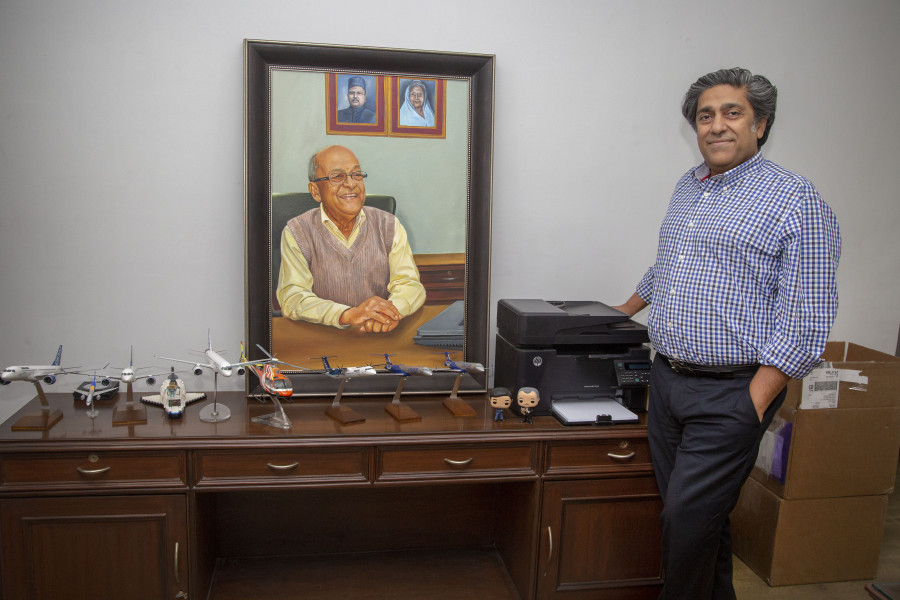Interviews
Sudhir Mittal: Young people need to spend time reading
In this interview with the Post’s Srizu Bajracharya, Shree Airlines Chairman Mittal reveals how he has found returning home to work, and the opportunities he sees within the aviation sector. Excerpts:
Sirzu Bajracharya
It hasn't been long since Shree Airlines, a prominent helicopter charter company, started scheduled fixed-wing services. Following the fleet expansion, Shree Airlines has steadily thrived in the competitive market, with chairman Sudhir Mittal taking the helm.
Before joining the airline, which his late father Banwari Lal Mittal established, he lived in the US where he was the country director for The World Bank’s International Finance Corporation (IFC). However, he wanted to come back to Nepal to do something in the country itself. In this interview with the Post’s Srizu Bajracharya, Mittal reveals how he has found returning home to work, and the opportunities he sees within the aviation sector. Excerpts:
You were with IFC for several years. How has that experience helped you lead in this sector?
To be honest, it hasn’t. It has been a disadvantage, for the countries are very different. There the system works according to rules and regulations, while here we have to look for order. I am not comparing the two countries, but sometimes it feels illogical to keep explaining ‘the given situation’ to organisations.
For example, Shree Airlines is looking to obtain an international flight permit, and we perhaps will soon, but I have had to explain on multiple platforms why the country would benefit from international flight schedules from Shree Airlines. There are four million people who travel in and out of the country, and Nepali airlines only capture 15 percent of this crowd, which is only about six lakh people.
The rest are using foreign airlines, which means that contribution goes to international carriers and the Nepali economy gets none of it—plus we are losing the foreign exchange. I have been a
proponent of the airlines’ need to expand their market; if we can capture even 50 percent of people travelling in and out of the country, we will strengthen the economy a lot.
Nepal has had several aviation accidents, could this be a reason why we are unable to expand Nepali fleets?
It’s a misconception altogether. The rate of accidents in Nepal is very low. The kind of accidents that happen in Nepal come under general aviation and, in comparison, general aviation accidents are very common world-over. Also, Nepal’s landscape is challenging and flight is sometimes the only option. Looking at those factors, I don’t think the situation is as bad as it seems—these accidents have overplayed the danger of domestic flights in Nepal. Also, compared to what happens in the world, the loss of lives is still low. Plus, with our chartered helicopters service, we have saved more lives than we have lost.
With Visit Nepal 2020 nearing, what does Shree Airlines have in plan for the year?
This is one of the reasons why we have been trying to apply for an international permit, as we want to bring tourists in with our carriers. Although it’s okay in whichever carrier they come—so long as they are coming to visit Nepal, it would be beneficial for Nepal if they travelled in Nepali carriers.
Since starting scheduled flights as an airline, what has the experience been like for Shree Airlines so far?
It has been a very challenging journey. My father already had an expansion plan before the earthquake, and we discussed how the helicopter sector was saturated. Naturally, we wanted to progress from rotor-wing to fixed-wing flights. However, because of the earthquake, we had to delay the launch.
We started this journey about two years ago, and it was difficult because of my lack of experience of working in Nepal. That was in the beginning, but we have mostly overcome those challenges. The major problem was how I expected things to happen the way it should have, but here things took a bit longer and I struggled to convince people why some things should happen in particular ways.
We enjoy operating in Nepal, however, and we provide premium services with jet aircraft, and we try to maintain our schedule as much as possible. Moreover, over these two years, we have done reasonably well.
What sets Shree Airlines apart?
We have achieved everything we set out to, when we started. We are not too shy to say we provide premium services and that we are a bit more expensive than other flights. But at the same time, because of competition, we have managed to drop prices significantly. We try our best to do things differently. However, the challenge is that our flights are short, and even if we want to, there is no scope for providing many additional services.
What is the current scenario of the Nepali aviation sector like?
There is tremendous competition in the aviation sector today and, therefore, many opportunities for growth—employment too—with many avenues to expand with international airports popping up in Bhairawa and Pokhara.
How can aviation sector careers be a promising option for young people?
Jobs in the aviation sector are up-and-coming for youth looking to grow their careers. Many of our attendants, after getting some experience, have been picked up by other international airlines; we don’t stop them because they have to keep growing too. It’s the same for our ground staff, once they gain some experience, they get opportunities to work with international airlines—they are all looking for experienced people.
As chairman, what are your primary concerns? How do you translate your visions to employees?
There are many things, but primarily they are about how our flight schedules and our services should be maintained, and that our passengers should not suffer. I keep telling my employees we are in the service industry, and customer satisfaction is paramount. We have to meet expectations and give them an experience they will come back for.
How do you solve everyday workplace problems daily? How do you keep staff motivated?
I am a bit hands-off when it comes to managing employees, I let other team members decide, unless I need to be a part of the conversation and decision making. Sometimes, when I receive complaints directly, instead of blaming my employees, I try to understand because you need to solve problems at the root—berating doesn’t help make things better, it doesn’t let people grow. I motivate staff by showing growth potential. I discuss our long term vision and how they can contribute and grow with the company.
Nepal has many flight institutes, does it help cater to the aviation sector?
Many people who have applied for inflight jobs mention the inflight courses they have taken. Regardless of that, we look for honest and industrious employees with integrity, because we provide them training and learning opportunities. There is great space for growth, if one is willing to work hard.
What do you look for in your employees? What advice do you have for young people who want to join a company like Shree Airlines?
As mentioned before, it’s always integrity, honesty and hard work. The rest, I think, falls into place naturally with training and growth opportunities. We also try to see where their interests are and try to match their jobs accordingly. Young people who want to join the company should study. Even though many say they don’t see how education is helping, I really think it is essential. Everyone needs to spend time reading, even if it’s just for an hour a day—there is no substitution for it. We would have been a different nation if everybody read and valued education. Next thing is, they should keep an open mind and stay curious, and travel and explore more.




 17.2°C Kathmandu
17.2°C Kathmandu





.jpg&w=200&height=120)






